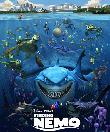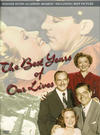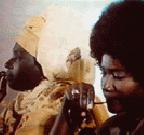
|
Richard Jenkins in The Man Who Wasn't There
I close with a film that few people saw in theaters, and in doing so, I focus on a character to which the film itself barely pays passing attention. Billy Bob Thornton stars in the Coen Brothers' typically weird tale of a laconic barber who makes a maladroit first venture into capital investment. His motives are almost unconscious, even to himself (remember that title), but they partake from some combination of loneliness, curiosity, spousal aggression, and an impulse to push the limits of his tranquil life, possibly for the first time. The investment doesn't work out, nor does the marriage, nor does the limit-pushing, nor, you could say, does his life. It's impossible to conceive that The Man Who Wasn't There will end especially happily, though because it's a Coen Brothers movie, we can also be sure that our path through the movie won't be predictable or uncluttered, and the sideshows along the way will be at least as interesting as the core narrative.
I recently returned to The Man Who Wasn't There on DVD and was glad to discover I liked it more on second viewing than I had on the first. Knowing that the Coens are experimenting with the notion of non-being—not just a man who isn't there, but a film that resists taking any one shape, and a plot that sidewinds and sidewinds into a purposeful black hole—made the bewildering scenes and choices a little easier to grasp. But I include the movie here because my favorite performance in the film, both times I saw it, is a tiny gem of character acting that is all too easy for movie buffs, much less the casual renters, to overlook. Richard Jenkins, a star of TV's Six Feet Under has just a couple short scenes as Walter Abundas, an alcoholic lawyer who hangs out on his porch and looks benignly disappointed at anyone who should happen to visit. His daughter Birdy, played by Scarlett Johansson, comes to embody a kind of youthful life-force to Thornton's character, but Jenkins barely notices. He isn't at all cruel to Birdy. Father and daughter just seem to have a quiet understanding that he loves her but he can't do anything for her. He is a profoundly sad character, despite the humor and likability which Jenkins so succinctly and magnificently invests in him. Walter is not a primary or even a secondary character in the movie, and yet the picture would feel entirely different—poorer, lesser—without his inclusion.
The cinema is filled with these kinds of characters, sideline players whom, for whatever subjective reason, you never forget. The world is also filled with fathers who may not feel like stars or scene-stealers, but they remain, in their quiet way, invaluable. Honoring the humble and the unspectacular, along with the prominent and the accomplished, is what Father's Day should prompt us to do. |













